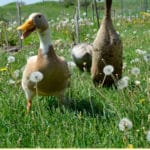What do Ducks Eat? (and What They Shouldn’t Eat)
What do ducks eat to make them happy and healthy? We’ll share guidelines for feeding ducks, either wild or tame, as well duck training tips and observations.
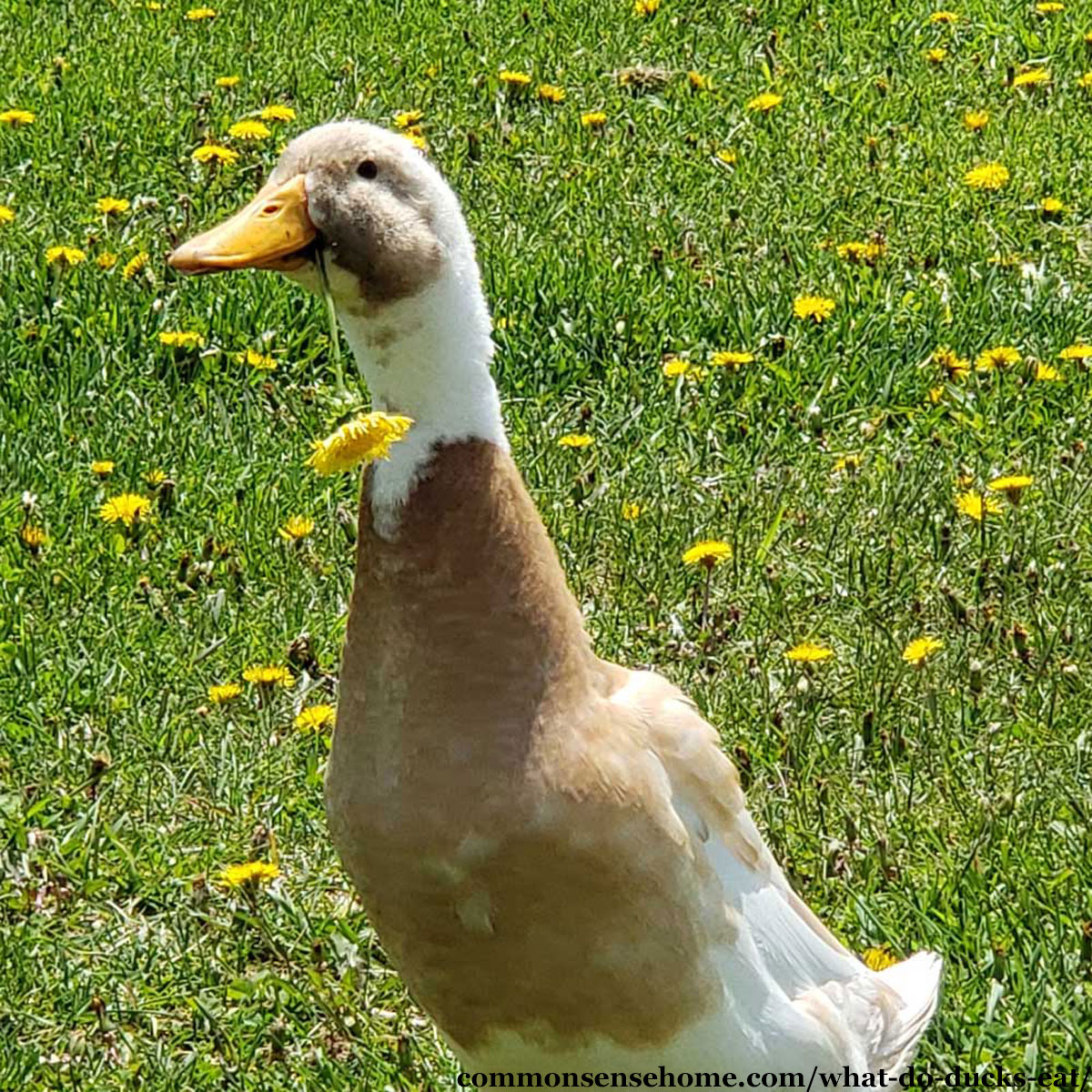
What do Ducks Eat in the Wild or on the Homestead?
Ducks are omnivorous, and will eat:
- Plant foliage/roots
- Seeds and berries
- Whatever they can catch, including bugs, amphibians, and small fish
Wild ducks naturally eat a combination of plants and animals. Domesticated ducks usually eat some sort of granulated or pelletized duck food, and snacks and forage. Some people also give their ducks scratch grains.
If domesticated ducks are able to forage, they will eat bugs (and anything else that’s small enough for them to catch) and greenery.
Ducks love having access to water, such as duck ponds or streams. They forage for aquatic plants, small crustaceans, frogs, fish eggs, insects, and anything else they can catch.
Some of the favorite treats our ducks like to eat are:
- Freeze dried mealworms or other freeze-dried insects
- Ripe tomato chunks
- Slugs and other garden pests
- Watermelon
Other nutritious treats include:
- Leafy greens like kale and collards
- Peas
- Squash or pumpkin cooked until tender
- Sprouted grains
- Sunflower seeds
- Rolled oats
- Broccoli
- Watermelon and other fruits (not citrus)
If you want to feed your ducks spinach or iceberg lettuce, only feed them small amounts. When weeding your garden, you can also dump the weeds in your duck pen and the duckies will nibble at them. They will also eat grains such as rice, corn, millet, and quinoa.
We also found that watermelon is a good crop to grow for a winter treat for your ducks
Ducks Need Niacin
Ducks need more niacin (Vitamin B3) than chickens, so it’s best to use a waterfowl blend of feed, or add some foods that are high in niacin to their diet. We add nutritional yeast to their feed (about 1 tablespoon per cup of feed), and cook up pumpkin chunks for snacking.
Other sources of Niacin include:
- Peas
- Sweet potatoes (raw or cooked)
- Tuna fish (in water)
- Salmon
- Sardines (in water)
- Small fish
Ducks Need Grit
Ducks also need to eat grit, which is made up of small rocks or bits of shells. They use the grit in their gizzards (a small muscular organ) to help grind up food.
Ducks eat small stones they find while foraging to use as grit, but if your duck yard doesn’t have small stones, you can purchase commercial grit. Use adult grit or oyster shells for mature ducks, and chick grit for ducklings.
If your ducks are laying eggs, using ground oyster shells as grit also acts as a calcium supplement for strong egg shells. Our ducks prefer straight oyster shells to the coral/oyster shell blends.
What Ducks Should Not Eat
Some folks go down to the local park and feed bread to ducks (or other leftover food). While ducks will eat bread, it’s basically junk food. Bread can also squish down and get stuck in their crops.
If feeding wild birds is allowed, stick to more natural foods, like sunflower seeds or oats. Avoid feeding so much that food is left sitting around to rot or attract pests.
DO NOT feed your ducks avocado or eggplant, as they are both toxic to ducks. Dried beans or larger nuts are also a problem.
Think of ducks like toddlers, and avoid choking hazards. Cut grapes in half, and make chunks small enough to swallow in one gulp.
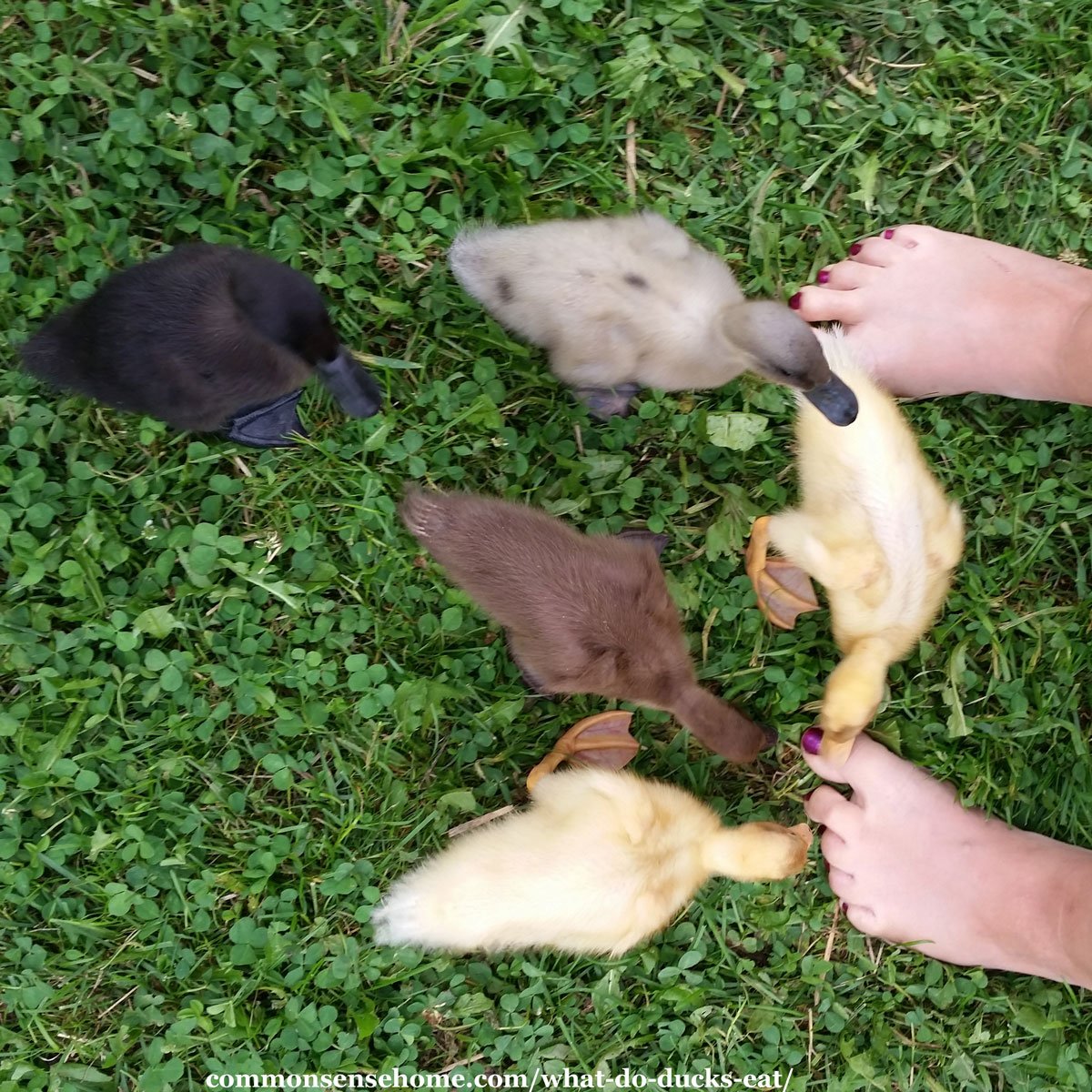
Duckies Explore the World by Nibbling
Duckies are kind of like toddlers – they waddle when they walk and put everything in their mouths. That’s why it’s important to not leave anything in your yard that could be dangerous for them to eat.
Would you like to save this?
If you’re working on any construction projects, be mindful of your “little helpers”. Ducks will happily nibble nails, screws, staples, metal shavings, Styrofoam, and insulation chunks. Thankfully, if it’s something bad for them, ducks will generally just spit it out and not try to eat it again.
Once, our duckies were exploring the straw in their outside shelter. As I was watching, I saw Miss Blue nab something out of of the straw.
She chewed on it for a bit, and then quickly spit it out and shook her head profusely. It turns out she had grabbed a cat turd. Miss Blue was fine, but she was more careful hunting in the straw after that.
What and How Our Duckies Eat
We feed our ducks a moist feed mash and a separate bowl of scratch grains. We also keep a bucket of water next to their food, because they like to take a bite of food and then wash it down with the water in the bucket.
The mash is organic layer crumbles with nutritional yeast mixed in, and enough water added to make it stick together. During the winter we use hot water to keep it from freezing quickly.
We mix the scratch grains with some oatmeal and nutritional yeast, because Miss Blue seemed to like the combination. They like the scratch most as we head into winter, and they put on extra bulk to protect them from the cold.
For summertime, we put a bucket of water outside and place their feed dishes next to it. In the winter, they shelter in the greenhouse when it’s too cold to go outside.
Some people avoid keeping food and water in the coop to keep the bedding dry. We found a simple solution to this by nesting the food and water containers together inside a bigger basin. Any spills are caught in the larger basin, not the bedding.
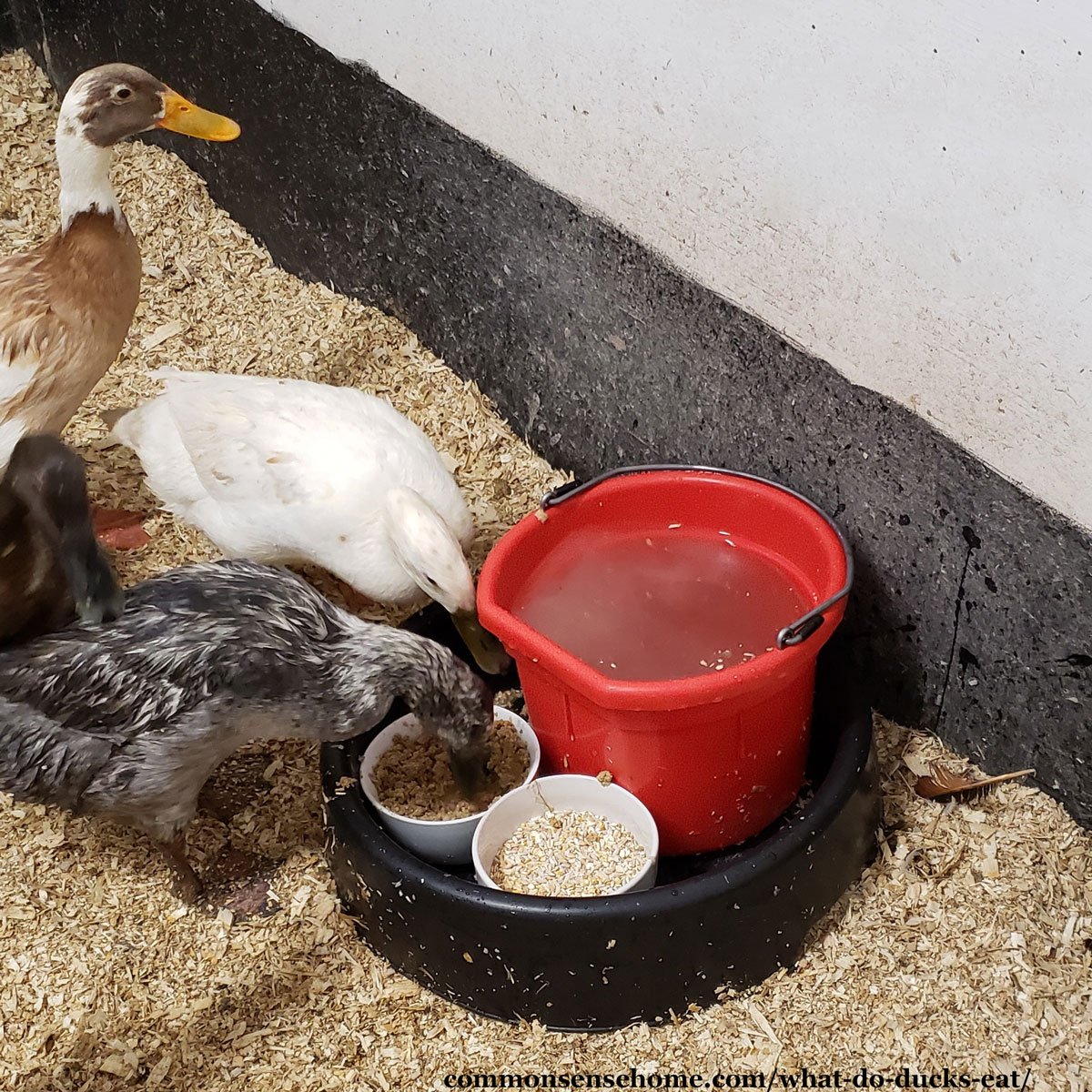
Why Ducks Need to Submerge their Heads in Water
Ducks need a water source deep enough for them to submerge their head in. Why, you might ask? Because ducks can’t blow their noses. The only way they can properly clean their sinuses is by rapidly dunking their head in water.
They also need access to water to activate their oil glands, which help to keep their skin and feathers healthy. For optimal flock health, a larger body of water such as a kiddie pool or a pond is best.
One Fun Trick to Help you Train Your Flock
We’ve trained our duckies to come to us by whistling every time we give them their favorite treats. If you’ve never done this with your flock before it’ll probably take a bit until they catch on.
Once your flock learns that the whistle means treats you can use this in several ways such as:
- Training your ducks to come back to the coop at bedtime.
- Getting them comfortable enough to eat treats or garden pests out of your hand.
- Guiding them to an area you want them to forage in.
There’ve been a few times on rainy days when we had to herd them in because they were having so much fun, but generally they come every night when we whistle for them.
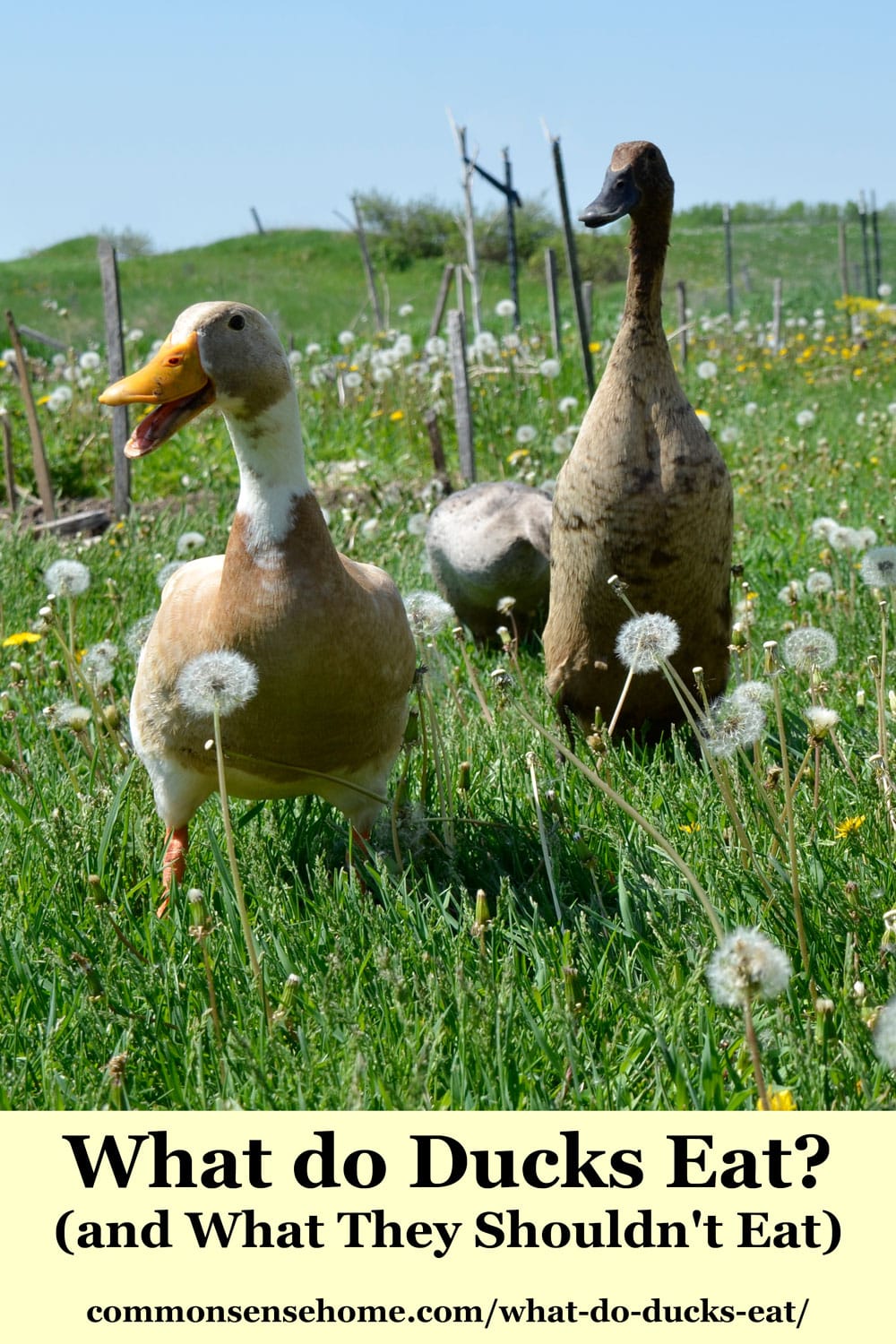
Related Articles
Introduction to our Runner Duck Crew
Duck Pest Control – Working with Ducks in the Garden
Ascites in Ducks – Treating Miss Emerald for Water Belly

This article was written by Duncan Neverman, duck whisperer, kilt wearer, and permaculture enthusiast. Duncan lives with his parents and brother on their multi-generational homestead in northeast Wisconsin. He is looking for the right young woman who shares his passion for healing and healthy environments.

